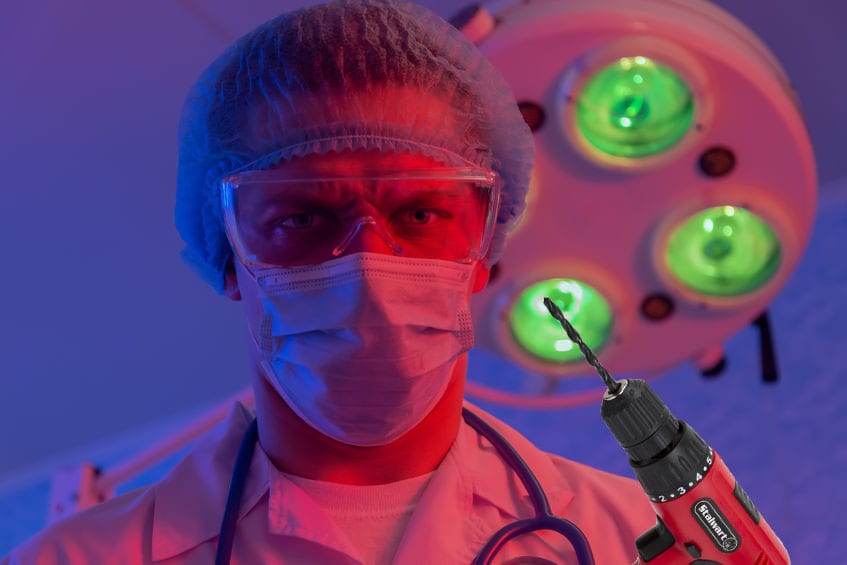Globogym Headquarters, CA– It’s interview season for 4th year Medical Students applying for residencies and every area of medicine has a beloved question that every applicant is asked without fail. Each question has a preferred answer that if chosen virtually guarantees an applicant getting matched.
Internal medicine makes all applicants pick a favorite electrolyte (bicarbonate is the correct answer).

Derm makes all applicants pick a favorite type of lesion (macular is the top choice).
ER makes all applicants pick a favorite consultant (inpatient psych).
Naturally in Ortho interviews following the bench press competition, applicants are asked to pick their favorite bone. To help the 13,000 MS4’s applying for ortho each year, I’ve created the definitive ranking of bones.
- Femur: biggest, strongest and joint replacements happen at both ends. The best bone but also the most popular.
- Tibia: great bone to nail, carries a lot of weight, often an open fracture when it breaks.
- Humerus: Just because it is #1 in the AO classification system doesn’t give it a free pass to the top of this list. It lives under but not actually attached to the biceps. Without the humerus, the biceps is nothing. Without the biceps, orthopods are nothing.
- Pelvis: home of the greatest joys and greatest tragedies of the human condition. Also the anchor for hip replacements.
- Calcaneus: calcaneus is Greek for “hard bone used for kicking walls.” That may not be true but it’s a hard bone. Bitch to fix.
- Radius: the biceps inserts on the radius. That alone is good enough for top 5.
- Ulna: close to the radius, used to deflect nightsticks and for holding up shields.
- Fibula: very underrated bone. Often stolen by ignorant oral surgeons who don’t appreciate the 15% of the body weight that the fibula bears. Crucial in ankle stability.
- Scapula: home of both origins of the biceps as well as 15 other muscular attachments. If you pick the scapula be able to name at least 8 of them.
- Clavicle: kind of a weak bone but it’s the only bony connection between the axillary skeleton and the arm. Plus it looks cool when it’s broken.
- Talus: the famed astralgus of the aviators. Bizarre blood flow like the scaphoid but slightly more reasonable size.
- Hamate: it has a hook.
- Navicular: neighbor of the talus and cuneiforms. Beware Kohler’s disease in the young.
- Lumbar vertebrae: 5 of them usually, strong, supportive but hard to tell them apart. Kind of like offensive linemen.
- Skull: we’re ortho. There are many bones including the ear dinky bones but above C1 it’s all functionally the same.
- Cuneiforms: kinda funny looking. 3 of them all named for where they are relative to each other, no one likes to go there. Kind of like the Dakotas if there was a middle Dakota.
- Phalanges: all of them whether fingers or toes. There are a lot of them and they’re all essentially the same. Sometimes hand weenies move a toe to the hand. That’s weird. Don’t bring that up.
- Baculum: humans don’t have them but would be cool if we did.
- Cervical vertebrae: move a lot, small, hard to tell apart. Basically late 90’s boy bands in bone form.
- Ribs: protect the Ancef pump and the bone aerator. Ribs have climbed the rankings since we started plating them sometimes.
- Thoracic vertebrae: need ribs to help support them.
- Metacarpals: broken by people who don’t know how to throw a punch. High correlation between metacarpal fractures and being an idiot with a short temper.
- Patella: floats in a sea of tendon. Can be a pain in the ass to fix when broken. Provides a mechanical advantage to the quads.
- Sacrum/coccyx: bottom of the spinal cord, the nerves that control pooping, peeing and pitching a tent exit from the sacrum.
- Metatarsals: hold toes out away from the ankles. Broken by dancers and joneses but 95% of “Jones fractures” aren’t really Jones Fractures. Only the zone 2s are.
- Lunate, capitate, triquetrum, trapezoid, trapezium: random ass wrist bones that only hand surgeons care about unless there’s a problem.
- Pisiform: basically a patella of the collar wrist. Lives in the Flexi carpi ulnaris tendon. Go ahead and break it. No one cares.
- Random other sesamoids, os, etc: not even real bones. Basically flecks of real bones.
- Scaphoid: the bone of the devil. Retrograde blood flow. Like retrograde ejaculation it’s annoying. Hard as hell to get to heal. Shaped like a twisted peanut. Bone of the god damn devil.
- Any other bones: if it ain’t important enough to be listed here, it doesn’t matter. Sorry sternum.







